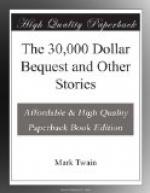I will remark here, in passing, that certain ancestors of mine are so thoroughly well-known in history by their aliases, that I have not felt it to be worth while to dwell upon them, or even mention them in the order of their birth. Among these may be mentioned Richard Brinsley Twain, alias Guy Fawkes; John Wentworth Twain, alias Sixteen-String Jack; William Hogarth Twain, alias Jack Sheppard; Ananias Twain, alias Baron Munchausen; John George Twain, alias Captain Kydd; and then there are George Francis Twain, Tom Pepper, Nebuchadnezzar, and Baalam’s Ass—they all belong to our family, but to a branch of it somewhat distinctly removed from the honorable direct line—in fact, a collateral branch, whose members chiefly differ from the ancient stock in that, in order to acquire the notoriety we have always yearned and hungered for, they have got into a low way of going to jail instead of getting hanged.
It is not well, when writing an autobiography, to follow your ancestry down too close to your own time—it is safest to speak only vaguely of your great-grandfather, and then skip from there to yourself, which I now do.
I was born without teeth—and there Richard III. had the advantage of me; but I was born without a humpback, likewise, and there I had the advantage of him. My parents were neither very poor nor conspicuously honest.
But now a thought occurs to me. My own history would really seem so tame contrasted with that of my ancestors, that it is simply wisdom to leave it unwritten until I am hanged. If some other biographies I have read had stopped with the ancestry until a like event occurred, it would have been a felicitous thing for the reading public. How does it strike you?
HOW TO TELL A STORY
The Humorous Story an American Development.—Its Difference from Comic and Witty Stories
I do not claim that I can tell a story as it ought to be told. I only claim to know how a story ought to be told, for I have been almost daily in the company of the most expert story-tellers for many years.
There are several kinds of stories, but only one difficult kind —the humorous. I will talk mainly about that one. The humorous story is American, the comic story is English, the witty story is French. The humorous story depends for its effect upon the manner of the telling; the comic story and the witty story upon the matter.
The humorous story may be spun out to great length, and may wander around as much as it pleases, and arrive nowhere in particular; but the comic and witty stories must be brief and end with a point. The humorous story bubbles gently along, the others burst.
The humorous story is strictly a work of art—high and delicate art —and only an artist can tell it; but no art is necessary in telling the comic and the witty story; anybody can do it. The art of telling a humorous story—understand, I mean by word of mouth, not print —was created in America, and has remained at home.




